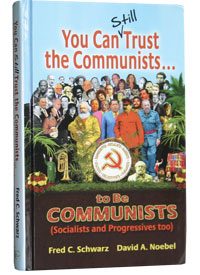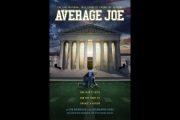
You Can Still Trust the Communists to Be Communists (Socialists and Progressives Too), by Fred C. Schwarz & David A. Noebel, Christian Anti-Communism Crusade: Manitou Springs, Colo., 2010, 370 pages, hardcover.
This 40th anniversary edition of Dr. Fred Schwarz’s classic anticommunist book You Can Trust the Communists … to Be Communists has been updated with several chapters by David Noebel of the Colorado-based Summit Ministries. Noebel makes a competent effort to update this valuable book to an age that has been taught that communism has collapsed since the fall of the Berlin Wall back in 1989.
Governments constituting nearly 1.4 billion people continue to claim the communist label, including China, Vietnam, North Korea, Cuba, and others, and many others of the old Soviet bloc have the same old Marxist-Leninist power and organizational structure even though they have adopted new party labels. Noebel’s introduction to the book notes, “In spite of communism’s deadly march through the 20th century, with over 100 million slaughtered and hundreds of millions more left persecuted and impoverished, communism’s promise of a future utopia continues to deceive the intelligent, the wealthy, the powerful and the political.” The allure of Marxism-Leninism continues to hold sway in American academia, as well as some political and cultural niches of American society today. Schwarz’s book is a healthy reminder of the reality of how many nations continue to be enslaved despite the fervent wishes of the majority who seek freedom.
While Marxism-Leninism is the brand name for the most popular form of tyranny of the 20th century, many of the organizational techniques used by tyrants and would-be tyrants are common to communists and non-communists alike. This is what makes Schwarz’s book a valuable study even in the post-Soviet era.
The original book by Dr. Fred Schwarz — a medical doctor by profession, who died in January 2009 — began with a simple premise: “It is that communists are communists. I intend to show that they are exactly what they say they are; they believe what they say they believe; their objective is the objective they have repeatedly proclaimed to the entire world; their organization is the organization they have described in minute detail; and their moral code is one they have announced without shame.” Schwarz called communists “perfectly understandable and almost mathematically predictable.”
By that statement, he did not mean that people under communist discipline were models of Judeo-Christian honesty, but rather “honest” in an entirely different form: “You can trust an armed bank robber to take the money and try to escape. Similarly, you can trust the communists to act in accordance with the laws of their being.” In short, communist leaders have announced their objectives and tactics in some of their publications, and these objectives and tactics are precisely what communists follow. These tactics can and should be studied by anti-totalitarians and used to defeat would-be tyrants.
Schwarz correctly observed, “Communism should be taught in the schools, but it should be taught with a moral directive. It should not be taught as an alternative economic philosophy, but as a system of tyranny.” Communism was less an economic philosophy than it was a prescription for political power; the economic “philosophy” (or “ideology”) is merely a practical method of accomplishing the political power grab Communist Party leaders sought. The ideology of Marxism-Leninism is a straight prescription for total and centralized state power, even though Marx and Engels both promised their ideology would lead to a “withering away of the state.”
When the Marxist economic doctrine conflicted with the political doctrine of obtaining centralized state power, the economic doctrine was done away with quickly. Schwarz reminds readers that communism came to power in Russia, China, and other places by economic policies that were sometimes the opposite of pure, theoretical socialism. Schwarz wrote back in 1960, “Classical Marxist economics advocated the collective ownership of land, but the Communists came to power in Russia and China by the reverse policy of the distribution of land, making everybody a little capitalist.”
Communist leaders were not being hypocritical in coming to power by jettisoning their economic doctrine, Schwarz explains, but rather following their most important directive. “The basic doctrine of Marxism-Leninism is, ‘Come to power.’ The Marxist-Leninist will promise whatever is necessary in order to achieve that end. Lenin, therefore, promised peace and land. But the gift of land was merely the bait that covered the barbed hook of Communist dictatorship.” Marxism-Leninism is nothing more than a form of gangsterism that couches the seizure of state power in ideological guise.
Schwarz wrote that Lenin and Stalin improved the efficiency of the dictatorial power model from other historical dictatorships. “Hitler worked on this principle: Tell a lie, make it big; repeat it often, and the majority of the people will believe you. The Communists have further developed this concept. Any lie that advances Communist conquest is, by definition, not a lie but the Marxist-Leninist truth.”
Schwarz notes that those attracted to communism and similar ideologies such as socialism and atheism have more often been the rich and privileged rather than the poor and downtrodden. He explains the attraction of some rich people to the ideology this way: “Life needs a purpose. Man is born with a heart to worship God, to reach out for something bigger and beyond himself, to seek some noble vision for which to sacrifice, some purpose for which to live and die. When denial of the existence of God deprives him of his natural fulfillment, Communism provides a substitute. It gives him a sense of purpose and destiny, gives meaning to life, and provides a motive for sacrifice.” And while sincere communist ideologues in history have been few — and non-existent in the state power structure of actual Communist Party-run states — they have often sacrificed fortunes and their very lives for the misguided cause.
In the updated Schwarz book, David Noebel’s chapters link Marxism and every other leftist “ism” to the theory of evolution. Atheistic Marxists undoubtedly adhere to the theory of evolution because, in their view, it reduces man to a mere material being and explains his origins without recognizing the existence of a Creator. (Never mind that no matter how far back the evolutionist goes to show where we — or the cosmos — came from, he can only theorize that something came from something else that already existed.) However, while many Christians reject evolution as conflicting with the creation of man by God, other Christians do not see a conflict, believing that God could have performed His miracle of creation over a period of time longer than six calendar days. Christian apologist G.K. Chesterton argued in his masterpiece The Everlasting Man that the scientific theory of evolution was a “problem” of no consequence to Christians:
Evolution really is mistaken for explanation. It has the fatal quality of leaving on many minds the impression that they do understand it and everything else; just as many of them live under a sort of illusion that they have read the Origin of Species…. Slowness has really nothing to do with the question. An event is not any more intrinsically intelligible or unintelligible because of the pace at which it moves. For a man who does not believe in a miracle, a slow miracle would be just as incredible as a swift one.
Readers who agree with Chesterton will obviously disagree with Noebel’s position that evolution does conflict with Christianity. But if you do disagree with him on this point, please do not allow his emphasis on the subject to become a stumbling block to reading fully this very valuable and important book.
In this reviewer’s opinion, the only real weakness in Schwarz’s original book, and in the updated version, is the pessimistic tone and the lack of a clear action plan to reverse the communist and totalitarian advances of the 20th century. Schwarz noted in 1960 that the pace of communist conquest was such that communism had conquered more in 60 years than Christianity had reached in nearly 2,000 years: “Lenin established Bolshevism with seventeen supporters in 1903. He conquered Russia with forty thousand in 1917. Today, the party of Lenin has conquered one billion. The population of the world is two and three quarter billion.” It sounds like an ominous pace, but that pace of communist conquest has abated — and even retreated in some places around the globe. This should be heartening to freedom-loving Americans.
Dr. Schwarz’s lack of a comprehensive organizational plan explains how he was able to energize thousands of Americans toward anti-communist activism in the 1960s, but never able to get his own organization — Christian Anti-Communism Crusade (CACC) — off the ground in any nationally meaningful way. The John Birch Society became the primary beneficiary of most of Schwarz’s inspiring addresses and conferences in the 1960s, largely because they presented the detailed organizational plan and coordinated action agenda the CACC lacked. Thousands of Americans Schwarz had awakened in the 1960s moved over to John Birch Society membership rolls in short order.
But that doesn’t mean Noebel hasn’t improved on Schwarz’s valuable little book. He has. Every American should read this book to armor himself with the knowledge of how totalitarian ideologies organize and take over free countries, even free countries populated by people who want freedom.



